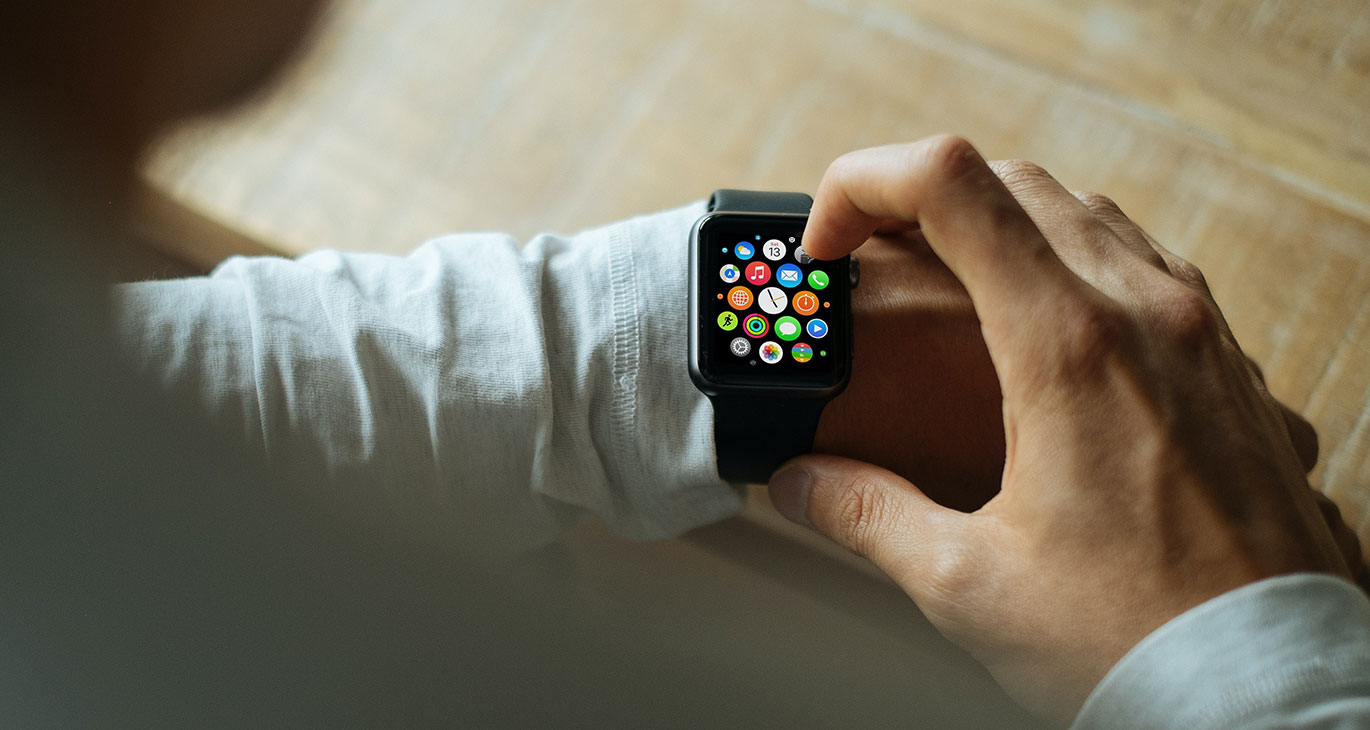
The Internet of Things in healthcare Part 2: Digital health and nursing applications

‘Ambient Assisted Living’ is an umbrella term for products and services designed to help elderly or ill people or those in need of care live independent lives. In the second part of our series of blog articles on the Internet of Things in healthcare, we take a look at the software solutions known as digital health and nursing applications. We also want to touch on the use of health data for insurers.
From smartwatches to smart clothing
We are all familiar with wearables; small devices worn on the body that monitor us digitally. These include smartwatches and fitness trackers, but also smart clothing and smart headphones. But how do they benefit us? Wearables have a variety of features that make our daily lives easier, motivate us to exercise or take precise measurements such as blood pressure, blood sugar levels and sleep, and then send the results to companion apps for evaluation.
Rising trust in smart health
It takes trust to use smart applications, especially ones relating to health. Perhaps driven by the Covid-19 pandemic when video calls with doctors became standard practice, Germans’ trust in smart health has clearly passed a critical point. According to BearingPoint, more and more people see no risk in their health data being monitored. The proportion has risen by 11 per cent since 2017 and is now sitting at 27 per cent. Moreover, more than half of those surveyed (53 per cent) are no longer concerned that health data might be insufficiently secure against third parties. [1]
Can insurers use health data to assess health risks?
For the insurance sector, the health data collected by apps have enormous potential in terms of improving the assessment of health risks, predicting diseases and, most importantly, preventing health problems. Insurers can utilise their expertise in the assessment and simulation of risks when it comes to prevention and offering comprehensive health advice. In particular, they could increase the quality of the data and events collected via health apps etc. and offer highly personalised recommendations. The availability of data is a major challenge in this context. Insurers must be authorised to use the data to make these personalised recommendations. Customers’ willingness to share their data with insurers rises and falls with their perceived benefits, the level of transparency about data collection and, last but not least, their trust in insurers to guarantee data protection and data security.
Apps on prescription
On the basis of the German Digital Healthcare Act (DVG) and the German Digital Modernisation of Healthcare and Nursing Act (DVPMG), people with health and long-term care insurance can already benefit from smart software solutions designed to support their therapy or make their day-to-day lives easier.
This support is available in two forms: digital health applications and digital nursing applications. Digital health applications were the first to arrive on the market. Section 33a of Book V of the German Social Code (SGB V) governs the entitlement of people with statutory health insurance to these applications. The applications share a common goal: to support the detection, monitoring, treatment or alleviation of illnesses, injuries or disabilities. Even before the outbreak of the Covid-19 pandemic, many private health insurers covered the costs of these ‘health apps’.
Digital health applications have been available for a long time
A directory of approved digital health applications is available on the main page of the German Federal Institute for Drugs and Medical Devices (BfArM). The applications are categorised by clinical pictures such as ‘Respiratory’, ‘Circulatory’ and ‘Metabolism and Hormones’, and come with a brief description. Even the user instructions for each application can be found on the BfArM site. There are web applications and apps for a very wide range of needs, such as applications to quit smoking, apps designed to improve chronic pain or knee problems, diabetes and depression, tinnitus, alleviate mental, psychosomatic and somatic complaints relating to cancer and much more. These applications aim to change the long-term health habits of patients through coaching, information, guides and, if the patient has any questions, chatbots. Most premium applications are available from the Apple and Google stores.
Unlike statutory health insurers, private health insurers do not depend on an application having been approved by BfArM when it comes to supporting digital health applications. However, an app’s medical necessity does have to be demonstrated. The Association of German Private Healthcare Insurers (PKV) is calling on the government to provide more legal clarity in this regard. According to the PKV, legal clarity is needed so that policyholders are able to receive supplementary digital health applications as part of their existing tariffs.[2]
Digital nursing applications are on the starting line
Just like digital health applications, similar care solutions are to be created in the form of digital nursing applications. The digital nursing application guidelines were published on 2 December 2022 and, according to BfArM, the digital application portal is available for applications to be submitted for a digital nursing application to be added to the directory. No applications were available as of end of 2022. Policyholders reportedly have access to benefits of up to € 50 per month for the use of digital nursing applications as well as support services when they use these apps. This is based on Section 40a and Section 40b of Book XI of the German Social Code (SGB XI).
As the same legal framework applies to everyone, people with statutory and private health insurance alike can take advantage of this offer.
msg.Insurance Suite is a strong platform for insurers
With regard to the digitisation of healthcare, even insurers can position themselves as service providers and offer insurance cover for AAL innovations. Seamless integration into end-to-end processes is important in order to operate cost-efficiently and the product portfolio can be maintained quickly and easily to accommodate new offerings. Digital health applications and – looking ahead – digital nursing applications are applied for and processed quickly and easily by the automated processes in our solution msg.Health Factory, which is part of msg.Insurance Suite.
[1] https://www.bearingpoint.com/de-de/insights-events/insights/smarte-gesundheit-2021/
[2] https://www.pkv.de/positionen/digitalisierung/
